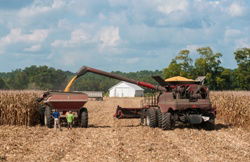
The US EDA grant will enable six counties in the I-74 Corridor, comprised of Dearborn, Decatur, Franklin, Ripley, Rush, and Shelby Counties, to examine the agricultural output in their regions to identify opportunities for creating new markets, applications, or processing facilities that can enhance the local value of the agricultural output. This will create new markets and income for local farmers, generate more local jobs connected to agriculture, and capture a greater source of revenue for the region’s communities.
The Rural Economic Development model was created as a collaboration between the Indiana Economic Development Association (IEDA), the Indiana State Department of Agriculture, and the Purdue Center for Regional Development (PCRD) with support from the Indiana Farm Bureau, Indiana Corn Marketing Council, Indiana Soybean Alliance and the Indiana Office of Community and Rural Affairs.
“As a region, we are focused on leveraging our region’s agricultural assets with the hope of creating new markets, generating more local ag-related job opportunities, and enhancing the revenue of our local farmers,” said Economic Development Director Sarah Lamping.
The Rural Economic Development Model employs a proprietary technology developed by PCRD that enables counties and regions to examine the agricultural output unique to their locale and then engages a local planning team composed of local economic development officials, farmers, and other local stakeholders to create and implement a plan to leverage local agricultural outputs, expand existing agribusinesses and attract new economic opportunities.
The 24-month process kicked off in the fourth quarter of 2021 and will be completed in July of 2023.
(City of Batesville press release)



